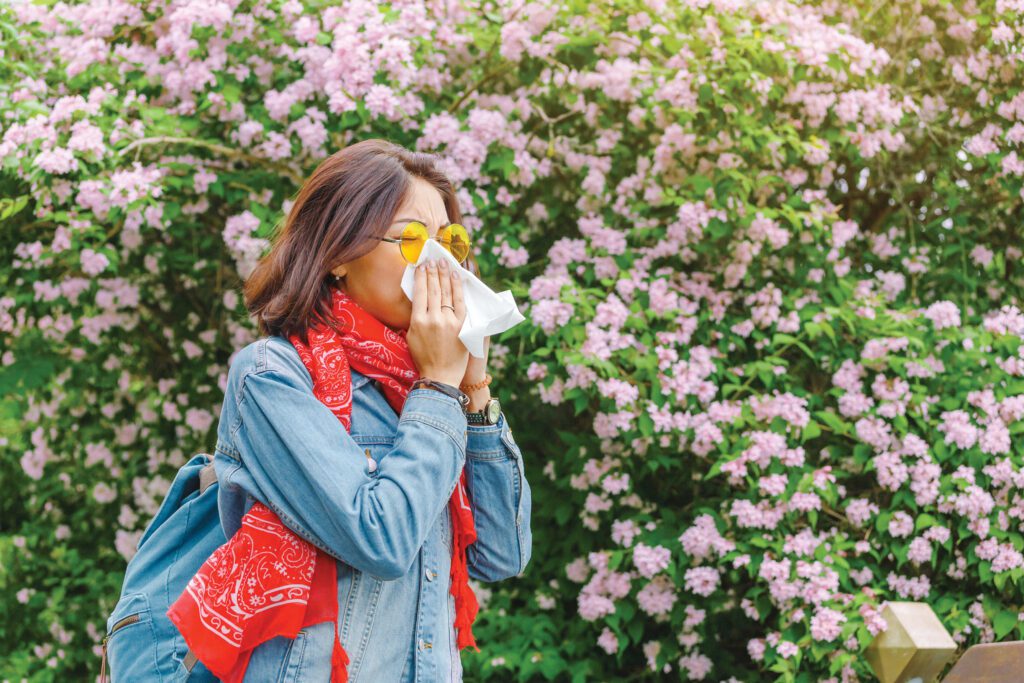And How to Alleviate Them
As spring flowers give way to summer sun, many assume their seasonal allergies will fade away along with the daffodils and tulips. Unfortunately, along with barbeques, campouts, and pool parties, summer can also bring a new wave of allergens including tree, grass and weed pollen. What follows are several tips to help you avoid the summer sniffles and enjoy the sunny season.

What are Allergies Exactly?
While the immune system ordinarily produces antibodies to protect against harmful viruses and bacteria, it occasionally mistakes harmless airborne particles (such as pollen) as a health threat. When pollen enters the body through the eyes, nose and lungs, the immune system produces a certain type of antibody called immunoglobulin E (lgE). When these antibodies attack allergen particles, the body sends chemicals known as histamines into the bloodstream. Histamines, in turn, create the unpleasant symptoms associated with seasonal allergies.
Seasonal allergies are unfortunately both common and costly in the United States. According to the National Institute of Allergy and Infectious Diseases, between 40-50 million Americans suffer from allergies. In 2005, Americans spent over 11 billion dollars in medical treatments to alleviate allergy symptoms. That’s nearly double the 6 billion dollars spent in 2000.
Common Symptoms
Seasonal allergies cause a variety of bothersome symptoms including:
- Watery, itchy eyes
- A runny or stuffy nose
- Itchy ears, throat, or roof of mouth
- Post-nasal drip
- Coughing
- Sneezing
- Dark circles under the eyes
In some cases, seasonal allergies can lead to other uncomfortable conditions such as sinusitis (an inflammation of the nasal passages), asthma, ear infections, headaches, fatigue and interrupted sleep.
Summer Allergies or Summer Cold?
While it may seem ironic that you could catch a cold in the heat of summer, both summer colds and summer allergies share many symptoms. However, there are ways to tell the difference between these conditions.
Allergy symptoms tend to occur about the same time each year during particular pollination cycles and last up to several weeks. Conversely, colds are more common in winter (though they also occur in summer) and symptoms usually last from 3-14 days.
While summer allergies and colds each affect the sinuses, allergies tend to produce runny, translucent mucus while colds produce viscous, yellowish mucus. Colds rarely cause watery, itchy eyes as allergies do, and allergies generally do not cause fevers or general achiness as colds do.
Resting, taking pain relievers, gargling salt water, and staying hydrated ease summer cold symptoms, while taking antihistamines and avoiding allergens can help relieve summer allergy symptoms.
Regional Summer Allergens
Trees, grasses, and weeds pollinate at particular times of the year according to geographic region. In the South, trees typically pollinate until June, while many weeds pollinate from mid-summer through mid-autumn. Several grasses such as Bermuda, redtop, vernal, timothy, and saltgrass pollinate through much of the year in our region. Other allergen-producing plants include curly dock, pigweed, sheep sorrel, sagebrush and Kentucky bluegrass. Additionally, ragweed has a long pollination season running from August through November.
While the South typically enjoys a verdant spring and summer, 2012’s unusually mild winter and warm weather have already contributed to rather high pollen counts this year. “I’ve been working in allergies since 1981,” says Dr. Gwen Carlton of Covenant Allergy and Asthma Care in Chattanooga. “This is the worst year I’ve seen. Trees that don’t usually start pollinating until February started earlier this year. Even people who don’t have allergies are developing pollen irritations.” Thankfully, there are several ways to reduce exposure to seasonal allergens.
Treatment Options
Although there is no instant cure for seasonal allergies, there are several methods and medications that may help alleviate several allergy symptoms:
- Over-the-counter (OTC) antihistamines such as Claritin, Allegra and Zyrtec can help relieve itching and sneezing. Some medications may cause sleepiness or require a prescription.
- Eye drops can soothe itchy eyes.
- Decongestants can help clear nasal passages.
- Nasal corticosteroid sprays can reduce inflammation.
- Nasal irrigation can remove excess mucus and pollen.
- Nasal decongestant sprays may alleviate stuffiness, but should only be used for a limited time as prolonged use may cause infection or other complications.
Most mild to moderate cases of seasonal allergies can be managed by the treatments mentioned above. For those seeking further relief, immunotherapy, commonly known as allergy shots, can help build the body’s immunity to specific allergens over time. “If you have recurrent infections like sinusitis or [receive] a marginal benefit from OTC medications, it may be a good time to go to a doctor,” Dr. Carlton says.
While seasonal allergies are still nothing to sneeze at, visiting your allergist, reducing your exposure to summer allergens, and choosing from a wide array of OTC treatments and medications can ease your allergy symptoms and help you better enjoy the sunny season. You’ll be breathing easier in no time.

